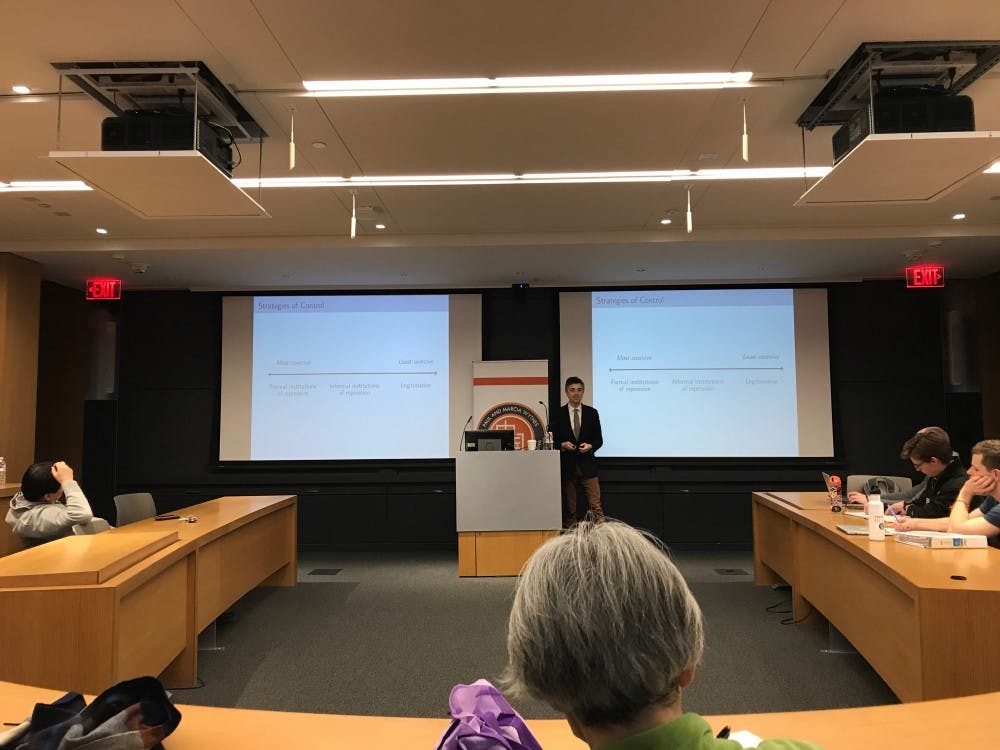Daniel Mattingly is not one to take conventional wisdom regarding political repression in China at face value. While scholars before him have stressed the role that explicit legitimation and repression play in coercing the Chinese people, Mattingly, an assistant professor of political science at Yale, suggested that there are more implicit mechanisms at play. He argued that the heart of informal political repression exists at the village, rather than the national, level.
“There are more informal institutions somewhere between formal institutions of repression and legitimation,” Mattingly said in a lecture at the University on Monday, April 30.
Mattingly began by highlighting the vast field of scholarship that paints civic society and social ties as crucial to institutional accountability. However, Mattingly entered the scholarly debate at an angle. To him, kinship networks in China do not lead to accountable institutions. Instead, kinship networks often serve as informal institutions of repression.
Mattingly then discussed some of China’s repressive policies that he suggested go hand in hand with the country’s urbanization, mentioning the confiscation of land and the two-child policy. He wanted to know why Chinese people were likely to comply with policies that clearly infringed on their autonomy.
“Community groups also give officials leverage over citizens and can serve as informal institutions of repression,” Mattingly said.
In order to support his argument with raw data, Mattingly conducted a survey to measure trust in hypothetical local elections that he conducted in villages across rural China in 2013. The survey gave participants hypothetical choices in electing candidates, randomly varying whether or not the candidates were part of kinship networks, attended the temple regularly, or were members of the Communist Party of China.
Mattingly found that people were less likely to trust CCP candidates at the local level. At the same time, however, he saw that local, civil society groups based in clan membership and lineage encouraged people to trust political candidates. Mattingly concluded that the way the CCP aimed to solve the problem was by taking advantage of informal repression.
Mattingly then presented some of his field research dealing specifically with informal repression in China. He introduced a case study in which he compared two nearby villages in China: Chalong and Kaijia. He chose these two villages because of their similar characteristics, including the absence of well-developed or active lineage groups. The village of Kaijia hosted a temple fair each year to bring the community together, while Chalong did not.

Mattingly found that Chalong, the village with fewer social ties, also had less informal repression. When local officials decided to confiscate some of the farmers’ land to build factories, the farmers surrounded the earth movers to prevent them from getting to the fields.
While the farmers in Chalong were successful in keeping the earth movers at bay, the villagers of Kaijia told a different story. Kaijia was headed by a Communist Party secretary who was a native of the village. The secretary aimed to cultivate tradition and social ties by hosting an annual traditional Chinese folk festival. Since there was a stronger sense of community in Kaijia, the farmers did not resist when the village officials came in to confiscate land.
Mattingly concluded his lecture by suggesting that the way in which authoritarian figures nourish social ties and civil society groups to take advantage of people applies to many different contexts.
“The tactic of informal repression is used by autocrats in many different contexts,” Mattingly said, mentioning Russia as just one example.

The question and answer session featured a lively discussion between Mattingly and the audience.
“Professor Mattingly’s discussion of some of the lesser-known instruments of state power demonstrated that the same institutions we often perceive to be conducive to healthy democracy can be employed towards authoritarian ends,” noted Kyle Zelenitz ’21 upon leaving the lecture. “And the diverse questions and comments of those in attendance were also really interesting and shed light on the processes of academic review.”
This lecture, titled “The Art of Political Repression in China” took place in A71 Louis A. Simpson International Building on Monday, April 30, at 4:30 p.m.








